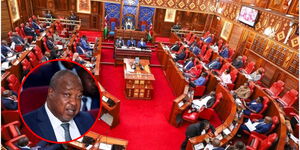Hello and welcome to the Evening Brief Newsletter where we are zooming in on Ruto who is ready to lose Ksh193 billion in the Finance Bill 2024.
Situational Awareness: Situational Awareness: If you are among over 21,000 subscribers of this Newsletter and are struggling to find our emails in your inbox, check your promotions or socials tab. Once you see it, drag the email to the Primary tab to receive our future editions there henceforth.
If you are reading this Newsletter on Kenyans.co.ke website, subscribe here to receive the weekday email in your inbox.
You Can Reject the Bill But Beware
President William Ruto has hinted that he is not opposed to the Finance Bill 2024's rejection but highlighted far-reaching consequences across the board.
The President, while addressing the youth in Garissa, maintained that the Finance Bill as is accorded the state a chance to fulfill its mandate including hiring 46,000 teachers on permanent and pensionable terms.
On the list of 57 consequences to be suffered by Kenyan citizens, MPs, with whom the decision to pass or reject the bill lies, were not spared either.
What Ruto is Saying: "MPs should pass the finance bill to secure jobs for intern teachers, fund HELB and School feeding."
The Consequences: Through his State House Spokesperson Hussein Mohammed, the Head of State listed 57 sectors will suffer steep reductions in financing.
Members of Parliament, who control the National Government Constituencies Development Fund (NGCDF), will experience the stiffest reduction of Ksh15 billion.
Catch Up Quick: Since the 2018/2019 Financial Year, lawmakers have enjoyed a continuous increase in NGCDF allocation from Ksh33.2 billion. In 2019/2020, the allocation was raised to Ksh41.7 billion which was retained at the same figure for the financial year 2022/2023. In the current financial year, the allocation was raised to Ksh53.53 billion.
- In the 2024/2025 Budgetary allocation, the Treasury had allocated NGCDF Ksh62.9 billion.
Consequences to the Public: In total, President Ruto noted that should the bill be rejected, his government will consider reducing the budget by Ksh193 billion, some to key allocation.
- Operations in the Office of the President will see a reduction of Ksh451 million while the State House will lose Ksh500 million.
- Internal security, which is paramount, risks seeing Ksh2 billion wiped out while the Ministry of Defence will lose Ksh7.75 billion.
- Higher Education Loans Board, which caters to needy tertiary students, will lose Ksh3.2 billion and the university infrastructure will suffer a Ksh3 billion reduction.
- Primary and secondary schools' budgets will be reduced by Ksh1.6 billion while medical interns will see Ksh3.7 billion hived off their budget.
- Ongoing road projects will lose Ksh15.1 billion while last mile connectivity risk stalling after Ksh21.77 billion.
- Sugar farmers awaiting settlement of their arrears will take longer after Ksh1.7 billion is hived off while the cash transfer program will see Ksh5.5 billion taken away.
- Junior Secondary School interns, who secured a confirmation as permanent and pensionable employees, will take the greatest hit after the state removes their Ksh18.9 billion allocation, elongating their agony as a result.
In the Press: Voting on the controversial bill kicked off in Parliament at 3:00 pm. With a voting process that concluded at 5:30, a majority of the MPs voted to approve the bill to sail through to the second reading.
Kenyans, however, hit the streets across the country demanding total rejection of the bill despite the President agreeing to remove some of the highly contested taxes. In total, 16 changes were made to the proposal after an early morning meeting at State House.
Nationwide Protests & Unique Occurrences
On Thursday morning, Kenyans, mostly millennials and Gen Zs, thronged the cities of Nairobi, Mombasa, and Kisumu as well as other towns including Nakuru, Nyeri, Eldoret, and Nakuru among others.
During the protests that kicked off in the morning, chaos erupted in Nairobi forcing police to lob teargas at demonstrators, most of whom insisted that they were peaceful.
The overriding message of rejecting the Finance Bill, which was carried under #RejectFinanceBill2024 hashtag, was to reject the bill in totality.
Highbrow Occurences: The global noticed the struggles of the Kenyan youth and the #RejectFinanceBill2024 went viral in 10 other countries. They are the United States, Canada, Qatar, Dubai in the United Arab Emirates, Tanzania, Uganda, Rwanda, Australia, Ethiopia and South Sudan.
- The hashtag, #RejectFinanceBill2024, crossed over a million mentions on Twitter.
- NTV journalist Ibrahim Karanja confronted a police officer captured while beating up protesters. "There is a police beating up (a protester)... Why are you beating people? No no no. That is wrong. He is beating up protesters," he said while chasing after the officer on live TV.
- Police fired teargas inside a Super Metro bus forcing its passengers, some of whom claimed were not part of the protests, to scamper for safety.
- In Nairobi's City Center, protesters outnumbered police officers forcing the two to escape on a motorbike.
As we follow the voting process in the National Assembly, here are five other stories to keep tabs on today;
- High Court dismisses a petition that had challenged the Ministry of Education's decision to transition from 8-4-4 to the 2-6-3-3-3 Competence Based Curriculum (CBC) education system.
- Financial experts have forecasted a depreciation of the Kenyan Shilling against the United States Dollar starting from mid-next week.
- EPRA says that the government, in partnership with county governments, will create special locations for LPG refill centers away from residential areas.
- South Sudan’s political landscape faces fresh turbulence as Vice President Riek Machar accuses Kenyan mediators of overstepping their mandate in ongoing peace negotiations.
- IPOA has invited Kenyans to submit complaints regarding police conduct amid the ongoing Anti-Finance Bill demonstrations.
If you enjoyed this newsletter, share it with a friend.
This newsletter was written by Derrick Kubasu and edited by Brian Muuo.
Washington Mito contributed to the content.
Graphics prepared by Adongo Kyalo.

Popular Tahidi High Actor Dies Breaking News











